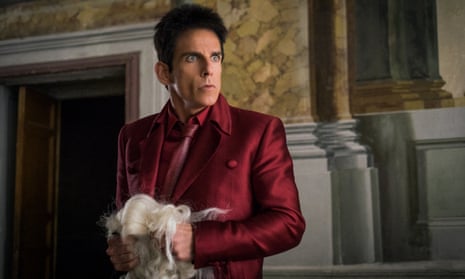In Zoolander 2, we first see Ben Stiller’s well-heeled and intellectually challenged male model hidden away from the world, avoiding contemporary culture, unaware of how everything has progressed in his 15-year absence. After enduring 102 minutes of laboured and misguided jokes, it feels like Stiller himself has been doing the exact same thing.
The Guardian’s product and service reviews are independent and are in no way influenced by any advertiser or commercial initiative. We will earn a commission from the retailer if you buy something through an affiliate link. Learn more.
In September 2001, Zoolander arrived in cinemas at a time when the average American wasn’t in the mood to watch a comedy about international terrorism in New York. It failed theatrically but its tightly packed script, filled with sharp jabs at the fashion industry and smartly pitched silliness, gifted the film with a dedicated cult following. It’s the film’s ludicrous moments that have lived on and have become something of a poisoned chalice.
Watching a group of male models frolic with petrol to the sounds of Wham! is likely to stick in the memory more than the film’s cutting satire. It’s easy to overlook the film’s assertion that fashion is linked to child labour and bulimia while laughing at Stiller trying to get “inside” a computer.
But looking back, the film was more incisive than its endlessly quoted one-liners suggest and it’s only after watching the sequel that this truly becomes apparent. Because, 15 years later, after a number of aborted attempts, a rather malformed follow-up is here to serve as a depressing reminder of what we’ve lost in the time in-between. Like a drunk uncle at a family party, it makes the same old jokes, only louder, and emerges as desperately and embarrassingly misjudged.
The silliness is still on show, albeit with a far less impressive hit rate, but the satire is muzzled. Ripping into the fashion industry isn’t quite as fresh as it seemed in 2001, with Sacha Baron Cohen’s Brüno, this spot-on Lizzy Caplan short and the biting wit of The Sarcastialist, a satire on the Sartorialist blog, all emerging since. Stiller, who returns as director and one of the film’s four writers, has lowered his aim, choosing instead to welcome and air-kiss the snobby elite who were initially the cause of scorn. The film’s cameos are wide, too wide, and include notable industry figures from Valentino to Anna Wintour, making the film an all-too-close bedfellow of the people it lampooned.
The script ticks off the same list of jokes, characters and scenes as the first but the freshness is replaced with a stench. It’s supposed to be a thank-you to those who made the film a cult hit on the small screen but it feels like an anonymous retread, a commodity that uses small appearances from Justin Bieber and Ariana Grande to appeal to younger viewers.
The original’s edge has been smoothed down to a soft putty. The attempts at risqué humour fall flat, unforgivably so. Benedict Cumberbatch’s much-discussed cameo as a gender-neutral model called All had already been labelled transphobic after the trailer’s release and on screen it leaves a sour taste. The film’s co-writer Justin Theroux claimed the joke is actually on “two ageing, middle-aged models” while Cumberbatch’s character is “empowered”. His explanation assumes a level of depth that is entirely absent from the film and ultimately, it’s a poor attempt at doing something other than recycle the first film’s jokes.
Equally, a bizarre joke that involves Owen Wilson impregnating Kiefer Sutherland during an orgy and then Sutherland experiencing a miscarriage is so tone deaf and unfunny that it fails on every conceivable level.
Stiller’s grasp of the zeitgeist, or even comedy at a base level, has become slippery and it’s a regressive move for the multi-hyphenate whose last film as director, The Secret Life of Walter Mitty, while not entirely successful, seemed to be a sign that he was heading down a new path. Like his fashionista creation and his expertly played character in 2014’s Noah Baumbach comedy While We’re Young, he seems to be clawing at the world around him, trying to remain relevant yet emerging as someone hopelessly off-trend.

Comments (…)
Sign in or create your Guardian account to join the discussion